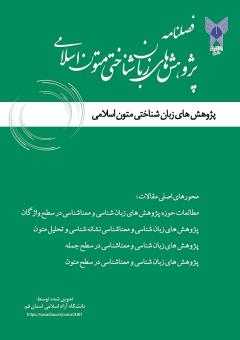بررسی معناشناسی محسنین در آیات قرآن کریم با روش همنشینی
محورهای موضوعی : پژوهشهای زبان شناختی و معنا شناسی در سطح واژگانام البنین قاسمی 1 , محمدرضا یوسفی 2
1 - دانشجوی دکتری، گروه زبان و ادبیات عربی، واحد قم، دانشگاه آزاد اسلامی، قم، ایران.
2 - استادیار، گروه زبان و ادبیات عربی، واحد قم، دانشگاه آزاد اسلامی، قم، ایران
کلید واژه: قرآن, معناشناسی, محسنین, رابطه همنشینی.,
چکیده مقاله :
اهل «احسان» در لسان قرآن به «محسنین» اشتهار دارند. این واژه در زمره واژگان پربسامد قرآن کریم است که به صورتهای «محسن»، «محسنین» و «محسنات» بهکار رفته و در نظام معنایی قرآن در ارتباط با کلمات دیگر صبغه معناشناسانه ویژهای مییابد. طیف وسیع و گستردگی مفهوم محسنین در قرآن و بررسی ساختار و سیاق آیات متمرکز بر فهم «محسنین»، سبب فهمی درست و جامع از آیات قرآن میشود. در این راستا، پژوهش حاضر با روش توصیفی- تحلیلی معناشناسی محسنین در آیات قرآن کریم را با روش همنشینی بررسی کرده است. نتایج حاکی از آن است که، واژۀ «محسن» اسم فاعل از فعل «أحسَنَ» و در قرآن در دو معنی بهکار رفته است، یکی در خصوص خیر رساننده و نیکیکننده به دیگران و دیگری در مورد کسی که کارهای نیک و رفتار صالح انجام میدهد، چه این رفتار عملی باشد، یا روحی و اعتقادی. این واژه دارای کلمات همنشینی مانند متّقین، صابرین، مجاهدین، مفلحین، و منفقین بوده که با آنها روابط معنایی دارد و با آمدن در کنار محسنین، بُعدی از ابعاد آن را روشن میسازند و معنای آن را کاملتر میکنند.
In the terminology of the Quran, the people of Iḥsān are known as Muhsinīn. This word is one of the frequently mentioned terms in the Holy Quran and appears in forms such as Muhsin, Muhsinīn, and Muhsināt. Within the semantic system of the Quran, this word acquires a special semantic connotation in relation to other words. The broad spectrum and vastness of the concept of Muhsinīn in the Quran, along with examining the structure and context of the verses focused on understanding the term Muhsinīn, leads to a correct and comprehensive understanding of the Quranic verses. In this regard, the present study, using a descriptive-analytical method, explores the semantics of Muhsinīn in the verses of the Holy Quran through the method of collocation. The findings indicate that the word Muhsin is an active participle derived from the verb Aḥsana and is used in the Quran in two meanings: one refers to those who do good and benefit others, and the other to those who perform righteous deeds and exhibit virtuous behavior, whether these actions are practical, spiritual, or doctrinal. This word has collocates such as Muttaqīn (the pious), Ṣābirīn (the patient), Mujāhidīn (those who strive), Mufliḥīn (the successful), and Munfiqīn (those who spend in charity), with which it shares semantic relationships. When mentioned alongside Muhsinīn, these words illuminate different dimensions of Muhsinīn and enhance its meaning.
قرآن کریم.
آلوسی، محمود بن عبدالله (1415ق). تفسیر روحالمعانی فی تفسیر القرآن العظیم والسبع المثانی. المحقق: علی عبد الباری عطیة. بیروت: دارالكتب العلمیة، ج4.
ابن فارس، ابوالحسین احمد (1413ق). معجم مقاییس اللغة. بیروت: مركز النشر مكتب الاعلام الاسلامى، ج3.
ابن منظور، محمد بن مكرم (1416ق). لسان العرب. تصحیح امین محمد عبدالوهاب. بیروت: نشر داراحیاء، ج2، 7.
احمد مختار، عمر (1386). معناشناسی. ترجمۀ سیدحسین سیدی. مشهد: دانشگاه فردوسی مشهد.
ایزوتسو، توشیهکیو (1378). ساختمان معنایی مفاهیم اخلاقی، دینی در قرآن. ترجمه فریدون بدرهای. تهران: قلم.
بی یرویش، مانفرد (1384). زبانشناسی جدید. ترجمه محمدرضا باطنی. تهران: آگاه.
پالمر، فرانک (1381). نگاهی تازه به معناشناسی. ترجمۀ کورش صفوی. تهران: نشر مرکز، چاپ سوم.
تجری، علیاصغر (1386). بررسی مفهوم احسان و محسنین در قرآن کریم. معارف، شماره 48.
تشکری صالح، ابوذر (1391). آثار محبت خداوند به محسنین در قرآن. معرفت، 21(180).
جوادی آملی، عبدالله (1395). تسنیم. قم: اسراء، ج2.
جوادی، محمد؛ نیکپی، امیر (1389). ایده و مفهوم ساختارگرایی با بررسی آرای سوسور و لوی استروس. معرفت فرهنگی اجتماعی، 1(3).
جوهرى، اسماعیل بن حماد (بیتا). الصحاح. بیروت: دارالمعرفة، ج5.
حسینی شاه عبدالعظیمی، حسین (1363). تفسیر اثنی عشری. تهران: انتشارات میقات، ج10.
دهخدا، علیاکبر (1396). لغتنامه دهخدا. تحقیق: جمعی از محققان. تهران: دانشگاه تهران، ج13.
دهقانپور، علیرضا؛ بخشی، ژیلا (1393). معناشناسی احسان در قرآن. پژوهشنامه معارف قرآنی (آفاق دین)، 5(17).
راغب اصفهانى، حسین بن محمد (1412ق). المفردات فی غریب القرآن. بیروت: دارالعلم الدار الشامیه، ج4-5، 1-2.
رفیعی، علی (1399). معناشناسی واژگان اخلاقی در قرآن کریم. قم: انتشارات مؤسسه بوستان کتاب.
زبیدی، محمد بن محمد مرتضی (1414ق). تاج العروس من جواهر القاموس. بیروت: چاپ علی شیری، ج18.
سروری مجد، علی (1393). ابعاد فرهنگ احسان در قرآن و سنّت. مطالعات فرهنگ- ارتباطات، 15(25).
شعیری، حمیدرضا (1388). مبانی معناشناسی نوین. تهران: سمت.
صفوی، کوروش (1378). درآمدی بر معناشناسی. تهران: سوره مهر.
طالقانی، سید محمود (1365). پرتوی از قرآن. تهران: نشر عروج، ج5.
طباطبایی، سید محمدحسین (1374). المیزان فی تفسیر القرآن. ترجمه محمدباقر موسوی همدانی. قم: جامعه مدرسین حوزه علمیه، ج3، 6، 8، 16.
طبرسی، فضل بن حسن (1372). مجمع البیان فی تفسیر القرآن. تحقیق: محمدجواد بالغی. تهران: ناصرخسرو، ج9، 2-3، چاپ سوم.
طوسی، محمد بن حسن (1376). تهذیب الاحکام فی شرح المقنعه. تهران: صدوق، ج2.
طیب، سید عبدالحسین (1378). اطیب البیان فی تفسیر القرآن. تهران: انتشارات اسلام، ج7.
فکوهی، ناصر (1386). تاریخ اندیشه و نظریههای انسانشناسی. تهران: نی.
قاسمی، رضا (1391). احسان در قرآن و روایات. پایاننامه کارشناسی ارشد. دانشگاه تهران: پژوهشکده ادبیات.
قرشی، علیاکبر (1371). قاموس قرآن. قم: دارالکتب الاسلامیۀ، ج2.
مصباح یزدی، محمدتقی (1376). اخلاق در قرآن. قم: مؤسسۀ آموزشی و پژوهشی امام خمینی، ج3.
مصطفایی، محمد؛ غروی نائینی، نهله (1389). مفهومشناسی احسان در قرآن کریم با بررسی حوزه معنایی احسان فردی. تحقیقات علوم قرآن و حدیث، 7(1).
معین، محمد (1395). فرهنگ فارسی معین. تهران: مؤسسه انتشارات امیرکبیر، ج4، چاپ پنجم.
مکارم شیرازی، ناصر (۱۳74). تفسیر نمونه. تهران: دارالکتب الاسلامیه، ج2، 22، 19، 5، 8.
مؤمن، سیدحامد (1393). مصادیق و آثار احسان در قرآن و حدیث. پایاننامه کارشناسی ارشد. دانشگاه معارف اسلامی قم.


